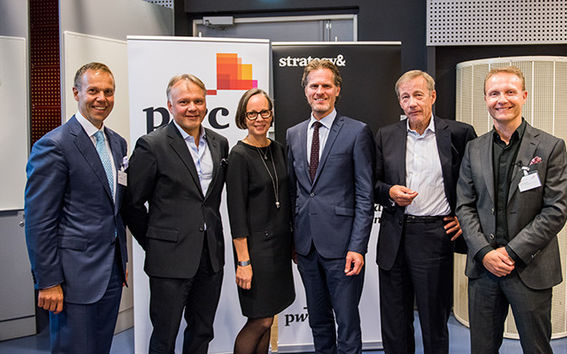Disruption impels us to either renew, adapt or die out

Gordon E. Moore stated already 50 years ago that change will never be this slow again. The way Moore’s law still holds true in the modern, disrupted, global market was a topical subject in Capital Markets Top Seminar, aimed at companies’ financial management and organised by PwC and Aalto University School of Business.
Disruption transforms the existing. It shakes the conventional and may turn the value chains and logic of entire sectors upside down.
‘If you think the change is stressing now, you should enjoy it, because in the future the rate of change will only accelerate’, stated futurist Stefan Hyttfors in his key note speech.
Petri Kokko from Google encouraged companies to disrupt their own businesses.
‘If you will not do it, someone will do it for you.’ Laura Raitio from Diacor agreed. ‘You have to positively cannibalise your own field. There is a need for free innovation and for courage to err, also.
The market is being redefined
Before long, disruption improves productivity and brings added value. Prior to this, a lot of restructuring that shakes the traditional thought has to happen.
‘A change in technology induces a change in people’s behaviour. And vice versa, the consumers’ expectations change technologies. We are only in the beginning’, noted Petri Kokko. ‘All devices will be smart and at the same time will collect data on their users. This enables e.g. real dialogue between humans and devices.’
According to Stefan Hyttfors, there is an ongoing transfer of power from institutions to individuals. ‘The large print media companies’ traditional competitive advantages regarding contents and distribution are no longer valid. With the Internet, advertising money is soon available to everyone.’ As a good example, Hyttfors mentioned the young YouTubers of the net that already have millions of subscribers globally. ‘A perfectly turnround model where the entire value chain is broken.’
The wind-down of institutions was discussed also by Laura Raitio, who has been the CEO of Diacor terveyspalvelut Oy for a year now. ‘The conventional traditions change when people reach the sources of information themselves.’ As stated by Raitio, in the health care sector this is manifested especially as a change in customer management. ‘The consumers really transform this business. The customers pay for value. We as a service provider must understand where this value comes from and also transform our ways of management to match the today’s needs.
It is hard to be humble if you are so good
Are we really as good as we think? Do we recognise the weak signals that will shake the market in the future in time? This classic utterance by Muhammad Ali can be well paralleled by a situation where disruption is unwanted or where its reception is missed.
‘Too many company managers try to convince themselves that they truly are on top of things. But can they afford to be careless?’ Stefan Hyttfors posed the question. In Petri Kokko’s opinion, disruption can be survived by taking risks. ‘This brings about fears, but is an important lesson. Be always present, make better decisions, and make sure your company attracts new, rising talents with entirely novel profiles!’
‘I would leave behind annual clocks and rather write scenarios’, was Laura Raitio’s formula. The health care sector education does not necessarily anymore reflect what is needed in the future, either. ‘We must for example be ready to receive all that data the patients bring to us with them. New talents are truly needed!’
Also professor Sixten Korkman, in his closing words of the seminar, pinned his hopes on our young students. ‘Finland’s biggest problem is our inability to react to resistance to change and to understand that we must adapt. In addition, as was already mentioned, we have too much faith in the institutions’ power. Luckily our new students know no fear of traditional ways of thinking. That will be our strength in the future!’
In conclusion, Korkman once again stated that we should not let a good crisis to go to waste, but to learn a lesson from it. ‘Whatever cannot last forever, must end.’
Read more news

Join a Unite! matchmaking event focused on health, urban sustainability, materials and digital
Calling researchers and industry partners to connect at a virtual matchmaking session designed to spark project collaborations for Horizon Europe funding. Registration deadline, 12 March.
Join the Unite! Virtual Education Summit- Registration now open
Join us in shaping international collaboration! This online event takes place 12 March, 2026.
Apply Now: Unite! Visiting Professorships at TU Graz
TU Graz, Austria, invites experienced postdoctoral researchers to apply for two fully funded visiting professorships. The deadline for expressions of interest is 20 February 2026, and the positions will begin on 1 October 2026.






